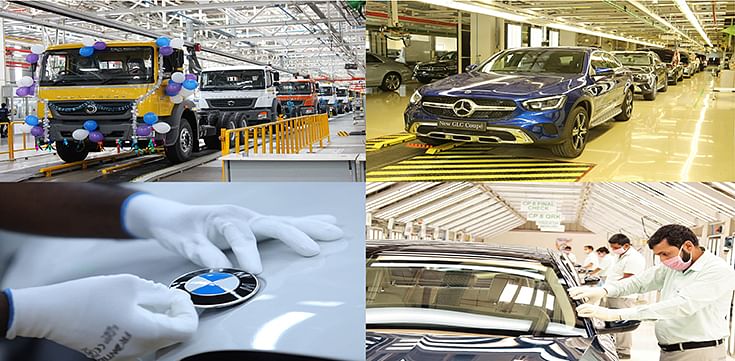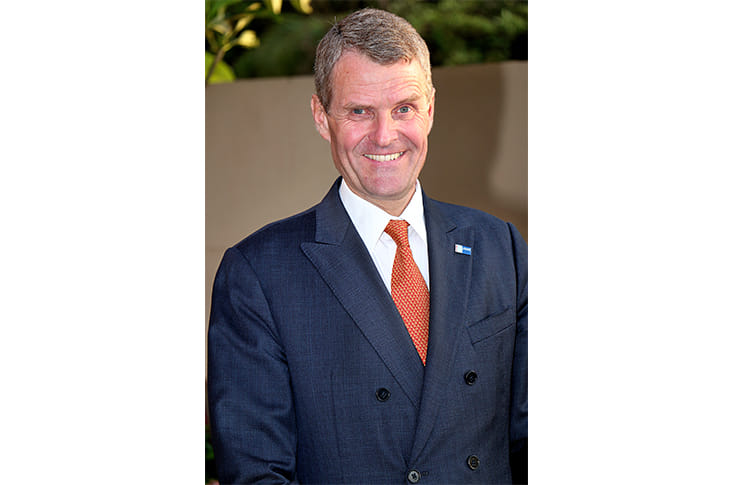India grows in stature as an R&D hub for German companies
The trade relationship between India and Germany goes back centuries. With organisations on both sides playing a key role in deepening the ties, India is increasingly becoming more attractive, not just as a market but also for finding the right talent. Bernhard Steinruecke, Director General of the Indo-German Chamber of Commerce outlines the details.
India and Germany have had historic ties and in fact, trade between the two countries spans over 500 years and remains a basis for strong economic and business ties. If one goes just by numbers, Germany continues to be India’s largest trading partner in the European Union and ranks fourth in the list of India’s top 10 trading partners worldwide.
Bilateral trade between the two countries in 2019 was 22 billion euros (Rs 181,874 crore), with exports to India accounting for 11.93 billion euros (Rs 98,625 crore) and imports from India at around 9.39 billion euros (Rs 77,627 crore).
The country is home to a large number of German majors, with some of them having established their presence over a century ago. In a conversation with Autocar Professional, the Director General of Indo-German Chamber of Commerce, Bernhard Steinruecke, says: “There are over 1,800-1,900 German companies in India, and the number has been growing over the years. We have seen phases of growth here. For instance, one was there after the war, then was during the industrialisation of the Indian economy and then after 1991. In 1994, Mercedes-Benz entered India and built its new plant in Chakan. After 2003, the numbers increased significantly and in 2008 Volkswagen entered India. In the past 10 years, we had at least 100-200 new German companies establish presence in India, and now we have over 300 German companies just in Pune. It (Pune) is the
largest single location for German companies, which is why we call it the Wolfsburg-Sindelfingen of India. The automotive and allied industry is one of the biggest sectors where German companies are present in India. There are more than 120 German component companies having a setup in India.”
Steinruecke has had first-hand experience of India’s economic growth, when he first came to India in 1993 as the co-CEO of Deutsche Bank. “India was a totally different country. That was the start of the liberalisation of the economy, and I was part of the very exciting times in those days. It was the start of electronics and other segments in the country, it also was the time when Mercedes-Benz and other German companies started coming to India. It was a remarkable time.”
Of course, there were some hiccups for foreign companies in India between 1997 and 2003, but since then, there has been no looking back.
It is worth noting that there are more than 1,600 Indo-German collaborations and over 600 Indo-German joint ventures currently in operation. But the present Covid-19 situation has impacted everyone. Steinruecke says, “It is for the first time in my 27 years of work experience that I can see not only de-growth but maybe even recession.”

Mercedes-Benz India, which celebrated its 25th anniversary in India in 2019, pioneered
the luxury car market in the country. Daimler India Commercial Vehicles rolled out its first trucks in July 2012. BMW India and Skoda Auto Volkswagen India are among the other German passenger vehicle manufacturers in India.
Trading places
So how is the Indo-German Chamber of Commerce dealing with the ongoing Covid-19 pandemic in India? “There is a cause of concern for everyone. We are talking with our members constantly, and trying to get them the required permits, supporting them to connect with the local authorities, police, if there is a problem. We are doing this jointly with the German Consulates. We are trying to help the companies get back to work. As you know, the lockdown in Pune and Mumbai (Red Zones) is very stringent, which means companies can only restart up to a limited extent.
From that perspective, we are in touch with the companies; most of them are trying to basically maintain their facilities to make sure it is fine. They are getting ready to restart production, some of the companies which are in other places where they are able to resume, but for them there is also the challenge of not having the required staff, because some of them may reside in Red or Containment Zones and they cannot go out. Basically, German companies are facing the same challenges that everyone has — there is nothing special or different about their experiences in dealing with the Covid-19 crisis,” explains Steinruecke.
Commenting on new trends for German companies in the automotive and allied industry, he says: "The Industry 4.0 trend will probably increase further because of the growth in the IT industry, and also because of the change in supply chain that will probably come off the load on the supply chain ecosystem, as we have it now to a more regional one. When you depend on a global supply chain and something suddenly happens, then entire manufacturing gets stuck, because there are one or two suppliers in the country who cannot deliver. The trend will go from a single-supplier system to multi-supplier system, so that the companies are able to deliver faster and are not affected if the supply chain is hit."
"In India, German companies are indeed well established and they will certainly use the opportunities, but at the moment with the Covid-19 affecting everyone alike, they have to make sure that their current investments are safeguarded and that they can get back to normalcy, before they can take a look at new ventures or investments. For them, it is also critical that India continues its efforts towards ease-of-doing business improvement, which is very important. I think India is trying hard to get there, but it is still a long way to go," adds Steinruecke.
The present crisis has changed the way we live, travel and for companies it means the way they do business. But as they say, in every crisis lies an opportunity. India's Prime Minister, Narendra Modi recently issued a call to
‘Be vocal for local’ or a sharper focus on localisation and domestic manufacturing. Responding to a query as to how he views the government’s recently announced
Rs 20 lakh crore stimulus package, Steinruecke says, “We will have to see, because mainly the package is a loan, and it depends whether the German companies mainly need loans or whether they have enough liquidity with the banks, so they don’t really require loans. From that angle, the stimulus package still has to be seen to see how it fructifies. If the variety of distribution is so huge and the variant is basically helping the poor with cash and grains, loans for MSMEs, it is a huge structure. It has been recently announced, so we have to see how it really helps.”
Skilling and creating specialists to help in the long run
A focus on manpower skilling and creating specialists will help the country find a bigger role in the global scheme of things. “Skilling is absolutely critical and the Indo-German Chamber has been involved in these for over 25 years with our vocational training courses in Mumbai, Pune, Chennai and Bangalore. This is a full-time program, where theory is taught at our training centres and practicals undertaken at German companies in India, where students get their hands-on training. This will continue and will increase. What we see during this pandemic is that skilling of staff is absolutely critical. With markets becoming more regional, companies have to have fully integrated manufacturing in their respective markets, so that they do not rely on cross-border trade. We have heard India's PM say that he wants India to become more independent. India is a huge market with huge demand; per capita income and consumption is extremely low. From that angle, I believe manufacturing in India will increase and if you want to be self-sufficient you need to have a more integrated approach, for that you need to have skilling.”
“It is very simple, and even to the extent, especially with many of the German companies. When they were globally active (pre-Covid), they had experts fly from one country to another to just maintain or install a machine, which is quite an expensive affair. Sometimes, as we can see now, this is quite impossible. That is why it is critical to have the expertise on the ground, supported digitally through video conferencing and other digital tools. Some basic expertise is still needed on the ground,” adds an optimistic Steinruecke.
Suffice it to say that the two longstanding trading partners bring out the best in each other and the bond can only grow stronger in the future.
Q&A with Bernhard Steinruecke,
Director General, Indo-German Chamber of Commerce

What are your thoughts on the deepening relationship between Germany and India — German engineering and India’s frugal innovation. How do you view India’s role in German companies' R&D setup and also how a growing number of Indian personnel are playing key roles in German organisations?
You are absolutely right. One of the best-known examples is German software company SAP, which has an R&D centre in Bangalore with more than 8,000 developers. Incidentally, in the Covid-19 crisis now, the IT industry is one of the best positioned, because they can work from home and continue with their businesses. From that angle, I think India is in a good position.
Apart from SAP, we have Mercedes-Benz which has its largest development centre outside Germany in Bangalore. Likewise, Siemens and Continental have large development centres, Robert Bosch has over 20,000 software engineers in Bangalore and Coimbatore. The German IT industry and German industry per se are using India as a R&D hub in a big way, and it will continue.
With India focusing on local manufacturing and many companies looking to shift their manufacturing operations from China, are you in talks with German organisations who wish to enter or expand their operations in India?
The idea of the prime minister (Vocal for Local) is not new; the Make in India campaign is basically the same. It says we should do more manufacturing in India, for the market, as a lot of products that we are importing especially from China, India does not need to import them and can be easily manufactured here. That made absolute sense, and now we have to be very careful as regards our foreign currency reserves and not spend them on imports. From that angle, it makes full sense.
German companies have been coming to India to make use of this development . But now, will many more come from China? I don’t know. That's because the Chinese market is opening up very fast, and therefore German companies who are in China will probably stay there. But we have always been telling them to not put all their eggs in just one basket. There could be alternatives — China + 1. Will India be the + 1? India is not alone. Korea, Thailand, Vietnam and Taiwan among others are also very competitive. Therefore, India has to know that it is not alone, and the country knows that.
It is, therefore, important for India to become much better and competitive. Of course, the ease of doing business needs to keep improving, because why should someone come if you are not in the absolute top league? This is where India has to improve, and the government knows that very well. The pandemic is a huge task, and I don’t know any government in the world which can manage it perfectly. Considering the huge size of the country, the Indian government is doing it very well, but there is still a long way to go.
What is your opinion about Indian companies setting up operations in Germany? Is there a strategy to encourage them to look at setting up their operations in the country?
As of 2019, there are close to 600 Indian companies in Germany. Of course, the best known is Bharat Forge — Baba Kalyani is a pioneer. In addition to the Indian automotive industry, we have the IT industry in a big way — we have TCS, Infosys, Wipro, Hexaware and Patni — in Germany employing thousands of people.
From that perspective, some Indian companies have huge opportunities in the German market but also as a hub for Europe. There could be more, and we are now looking at maybe some advantage from Brexit, because there are around 8,000 Indian companies conducting their European operation out of London, and they will need a new setup. We hope some of them will take Germany as the hub for Europe as we have a lot of advantages, which these Indian companies should use. We have incentives depending upon which state you are going to; greenfield investments, there are subsidies if you set up a company.
This feature and interview are from Autocar Professional's June 1, 2020 'Indo-German Special'. You can DOWNLOAD it here https://bit.ly/2BXYGue

RELATED ARTICLES
BKT, the ‘Off-Road King,’ Chases the Consumer Market
The company has unveiled a broad range of tyres for the Indian two-wheeler and CV markets.
RSB Group Prepares for Hyper-Growth: New Markets, Tech and Mission ₹10,000 Cr
From a small workshop in Jamshedpur to an engineering group with global reach, RSB Transmissions is preparing for its mo...
Beyond Helmets: NeoKavach Wants to Make Rider Airbags India’s Next Safety Habit
As premium motorcycles proliferate and riding culture evolves, an Indo-French venture is betting that wearable airbags, ...






 02 Jul 2020
02 Jul 2020
 33593 Views
33593 Views





 Shahkar Abidi
Shahkar Abidi


 Darshan Nakhwa
Darshan Nakhwa


